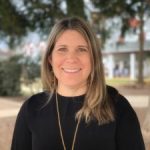Troubled by students she’s not reaching — ‘that no one is reaching’
AUSTIN, Texas — Anne Fletcher worries her students won’t succeed.
It’s been more than a year since the coronavirus shut down most college campuses, and many of the problems that emerged at the start of the pandemic still plague Fletcher, who teaches English and developmental writing at Austin Community College.
More students than ever have dropped her courses. They’ve been battered first by the virus and, more recently, by a brutal winter storm and a major power crisis. A student who contracted Covid-19 this semester has fallen behind, but every effort Fletcher has made to reach him has been fruitless. Two of her students have been hospitalized with the virus. Several have family members who died or lost their jobs. Others struggle to remain engaged in their new virtual world.
“I do feel in a sense that I’m failing some of these students,” Fletcher said. “I know in my mind I’m doing the very best I can. But they’re up against so much.”
Fletcher, who is 78, has been teaching for 50 years, but the days since March 2020 have been some of the bleakest of her career. The spread of Covid-19 forced the community college to shutter all 11 of its campuses in Central Texas just before spring break last year. More than a year later, the vast majority of courses remain online only.
In the beginning, teachers scrambled to record video lessons and help students get access to courses. Fletcher’s materials were already online, but she had never recorded instructional videos before and also had to quickly learn to teach live lessons and host online office hours. The college provided training and support, but some of Fletcher’s students couldn’t establish any internet connection at all. Others tried to keep up with her course using only their phones.
“That was a nightmare,” she said. “We lost some. They were used to in-person learning, and they didn’t know how they could do it. This was not what they bargained for when they signed up to start college.
“And we as professors could not express our frustration, our panic and our nightmares,” said Fletcher, an adjunct professor of English in composition and literary studies, who has taught at the college for 11 years. “We had to remain calm and do everything we could to help make the students feel more at ease and comfortable with online learning.”
“It is really alarming. We are in a crisis, there’s no doubt about it. Even though many have recovered, there are many who have not. It’s not really over because people are living with the aftermath of it.”
Anne Fletcher, adjunct professor, Austin Community College, speaking of the February storm that ravaged Texas
On the weekend everything first shut down, as people retreated indoors and scrambled to find available face masks, Fletcher found a public library branch that had not yet closed. With students’ papers in hand, she met several of them there, to help them with needed revisions. In the fall, she drove 30 miles to a nearby city, San Marcos, to bring students in another class books on their reading list.
At her age, Fletcher is more vulnerable than younger people to getting severely ill if she contracts Covid-19. But she said she wasn’t thinking about getting sick; she just wanted to ensure her students had what they needed.
“I did what I had to do,” she said.
Related: ‘It’s just too much’: Why students are abandoning community colleges in droves
About half the students Fletcher teaches are considered at high risk of not completing college. Many grew up in low-income families, are English language learners or come from historically marginalized communities. In addition to first-year English composition courses, Fletcher teaches developmental classes, for students who were admitted but did not score high enough on a state college entrance exam to be considered college-ready; those students simultaneously take college-credit English courses, which Fletcher also teaches, to help them make progress. In her first seven years at the college, she also was a GED instructor, teaching all subjects to adults seeking to pass their high school equivalency exams.
“From the very beginning of my career, I was concerned about the students who struggled,” said Fletcher. “Those students need extra help. I think I understand their needs. Not every teacher is aware that they need extra help and how to help them.”
She also is an instructor in the college’s Ascender program, which works to boost completion rates among Latinos and other underserved student groups.
Alejandra Polcik, the Ascender program manager at Austin Community College, said Fletcher frequently works on weekends, answers emails after hours and talks often to her and other program organizers about students’ progress. “She is conscious of the obstacles that we are facing,” she said. “She accommodates her students, but she never lowers her standards.”
In some ways, the students Fletcher teaches are like her mother, who emigrated from Ireland to New York City at age 16 with only a sixth grade education. She worked cleaning houses during the day and attended night school to earn first her high school diploma, then her nursing degree.
The example set by Fletcher’s mother, along with those of many strong teachers who “were there for me steadfastly all my life,” instilled in Fletcher a love of learning.
“I admired them and I wanted to be like them,” Fletcher said.
“I want to provide that help. I want them to be successful in college, not just in my class but in their other courses. I want them to have a better life. But I know there are some out there who I’m not reaching, that no one is reaching.”
Anne Fletcher, adjunct professor, Austin Community College
In her own career, Fletcher, who earned a bachelor’s degree in English at Good Counsel College in White Plains, New York (later merged with Pace University), and a master’s in special education at Fairfield University in Connecticut, started as a special education teacher in New York. She then spent years in Ohio working with children who had physical and cognitive disabilities. At other times she taught students in community college who needed more intensive instruction in reading and writing, to prepare them to enroll in college-level courses.
She returned to that work in 2010 after moving to Austin to be near her children and grandchildren.
“When I had the chance to come to Texas, I was seeking those who were struggling with English, the Latinx students,” she said. “They were the most in need. I saw that there were adults who also struggled with reading and writing, and they were actually more in need, because they were adults who were trying to improve their quality of life.”
In 2019 the college gave her the National Institute for Staff and Organizational Development (NISOD) Excellence Award, established to support individual schools’ recognition of their top teachers. She waves off the attention.
“I don’t do what I do alone,” she said. “Whatever success I and my students have is due to the joint efforts of all the members of the learning community. That’s really important for me to say, because I really believe that. I could not be doing this by myself. There are a great number of people who are helping the students be successful.”
Struggling students
In each of the last three semesters, Fletcher has lost more students than she did in any previous semester at the college. Typically only one or two drop her courses in a given semester, but she estimates she’s lost about 10 percent since last March. The academic careers of community college students are often tenuous, which is why Fletcher’s ability to retain them has been so important to her.
The pandemic hit community college enrollment the hardest, with preliminary numbers showing national enrollment down 11.3 percent from a year earlier, according to the National Student Clearinghouse Research Center.
“It’s hard to overstate how dramatic the disruption was,” said Texas Higher Education Commissioner Harrison Keller.
Related: How a decline in community college students is a big problem for the economy
The pandemic also took a toll on students’ mental health. Fletcher’s students began to communicate to her their increasing anxiety and depression over online learning, isolation and the pandemic at large, prompting her to shift how she started her classes.
Now, as students log in from separate locations across the city, they’re greeted by the soothing sounds of strings and woodwinds playing in the background and an inspirational quote on their shared screen. Sometimes the classical music gives way to a song like “Never Giving Up,” by Fearless Soul, “It’s a Beautiful Morning,” by the Rascals, or “Lean on Me,” by Bill Withers. The melodies are paired with lines from Maya Angelou’s “Still I Rise,” Amanda Gorman’s “The Hill We Climb” or an inspiring maxim.
She wants to fill her students with hope, she said, to keep them connected.
On a recent spring afternoon, after the music played, Fletcher, whose voice is steady and sure, reminded them of a tip she got from a friend who is a neuroscientist: “You can rewire your brain to be happy by simply recalling three things you’re grateful for every day for 21 days.”
Fletcher then launched into the day’s agenda, rattling off descriptions for the three rhetorical appeals — ethos, logos and pathos — and providing examples of each. Then she encouraged the students to seek help if they needed it in putting together their papers. “No one should feel badly if you’re struggling,” she said. “You’re here to learn to write an essay.”
Providing guidance outside classroom time is the norm for Fletcher. Living alone with her two dogs, she often spends nights and weekends reaching out to her students. She holds special online sessions to give personalized help to those struggling with their work. She also gives extra credit to those who turn in a biweekly confidential journal where they note how they’re doing, what’s going well and areas in which they’re struggling.
Fletcher is “available, for not just academics, but for whatever they may have needed,” she said. “I want to provide that help. I want them to be successful in college, not just in my class but in their other courses. I want them to have a better life.
“But I know there are some out there who I’m not reaching, that no one is reaching,” she added.
In instructor evaluations from last May, at the end of the first semester battered by the pandemic, students in Fletcher’s classes lauded her commitment to seeing them through the course.
“She provided a sense of reassurance that I wasn’t alone, and she was always so willing to help,” wrote one student, adding that Fletcher was encouraging and understanding of the student’s learning disabilities. “She didn’t add to my stress of school and online learning; she helped and made the chaos manageable.”
Another wrote: “I learned a lot of new things, especially for it being online. That’s how amazing she is!”
Related: Covid-19 has been bad for college enrollment – but awful for community college students
Carmen Garcia Hernandez, an 18-year-old from Kyle, Texas, who is the first in her family to go to college, started at Austin Community College last fall. But in the isolation of learning remotely, she said, some days it doesn’t feel like she’s attending college, and the routine of sitting at her desk all the time can feel overwhelming. Fletcher seems to understand, she said.
“She’s very approachable and makes me feel more confident to ask her questions if I need to,” Garcia Hernandez said. “She does her most to give us the most information she can, whether it’s in class or outside school resources.”
Facing another crisis, taking action
Despite the pandemic, Fletcher felt most of her students had fallen into a healthy rhythm as the spring semester began. But just a few weeks into it, a winter storm pummeled Texas in mid-February, leaving her and many of her students without power, heat or water — and in some cases, even food — for days.
Without electricity, Fletcher couldn’t open the garage door to get her car out. And even if she could have, her driveway and the roads were thick with ice. She was able to light her gas stove but hadn’t gone grocery shopping before the storm, so she cooked what she had left, a handful of frozen chicken breasts. And even when she was concerned that her own life might be in danger, Fletcher worried about her students. But her phone had died and she had no internet.
“I couldn’t contact anybody,” she said. “I couldn’t reach them to let them know what was happening. And I knew they were probably going through the same.”
When the winter storm first blew in, her son, who lives 25 miles away, wanted her to come stay with his family. But Fletcher felt it was too much of a hassle to pack up her dogs, including one that was severely ill, and she expected the power to come back within hours.
“We as professors could not express our frustration, our panic and our nightmares. We had to remain calm and do everything we could to help make the students feel more at ease and comfortable with online learning.”
Anne Fletcher, adjunct professor, Austin Community College
On the fourth day without heat or power, she charged her phone in her car long enough to call 911, and a police officer came to her home and was able to open her garage. She backed out her car so she could start it to charge her phone more, and contacted people at the college, asking them to let students know why she wasn’t responding to their messages.
In all, at least 111 Texans died as a result of the winter storm. Some Austin-area housing complexes, including a few where her students lived, still haven’t had water or gas restored or damage repaired. One of her students with a newborn briefly connected online to tell Fletcher the pipes in her house had burst and everything she had was destroyed. Fletcher offered to give her baby items that her grandchildren had outgrown, then wrote a letter to enable the student to apply for the college’s emergency relief fund.
Before the storm, Fletcher had routinely provided students with information about resources like local food banks and Covid-19 testing. In the storm crisis, she then began giving them information about preventing eviction, since some apartment managers, citing the need for repairs, tried to force tenants out.
“It is really alarming,” she said. “We are in a crisis, there’s no doubt about it. Even though many have recovered, there are many who have not. It’s not really over, because people are living with the aftermath of it.”
Fletcher worries the combined impact of the pandemic and the storm will stop some of her students from finishing the semester, but she’s determined to see them through. She’s offered special sessions to walk them step-by-step through writing their college papers.
“My goal is to do everything possible to keep everyone, and to have them be successful,” Fletcher said. “I owe it to the college and I owe it to the students. I couldn’t live with myself if I didn’t do everything possible.”
This story about community college professors was produced by The Hechinger Report, a nonprofit, independent news organization focused on inequality and innovation in education. Sign up for our higher education newsletter.
Published at Wed, 19 May 2021 20:22:00 +0000
Article source: https://hechingerreport.org/troubled-by-students-shes-not-reaching-that-no-one-is-reaching/



